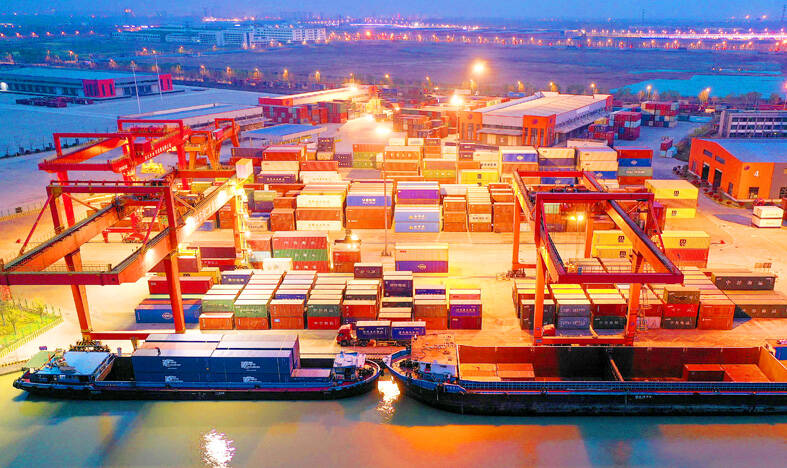China’s exports unexpectedly rose last month as demand from most Asian countries and Europe improved, and as the nation’s factories resumed production, boosting the economy’s outlook.
Exports jumped 14.8 percent in US dollar terms last month from a year earlier, partly driven by an uptick in shipments to Southeast Asian nations, along with resilient demand from South Korea and Europe.
Economists had forecast a fall surpassing 7 percent, and the surprisingly strong result was the most significant divergence from expectations since at least 2018.

Photo: AFP
Imports declined 1.4 percent, leaving a trade surplus of US$88.2 billion for the month, the Chinese General Administration of Customs said yesterday.
Over the past three years, booming export demand was a strong support for the world’s second-largest economy, and helped compensate for weak domestic spending caused by the country’s housing market slump and COVID-19 restrictions.
Exports began to contract from late last year as demand from the US, the EU and other countries all lost momentum. The rise last month was the first in six months.
“It was very surprising indeed,” Societe Generale SA economist Michelle Lam (林雪潔) said.
“Much of the rebound was likely driven by easing supply disruptions. Its impact on exports and production was likely far more serious than previously envisaged,” Lam said. “Therefore, today’s data seem to suggest the slowdown in external demand is not as concerning as previously thought.”
Stocks in China and Hong Kong pared losses after the data, with Hang Seng China Enterprises Index of Chinese shares traded in Hong Kong down 0.6 percent at the midday break. It fell 2.3 percent earlier in the day. The yield on 10-year government bonds rose one basis point, set for the first increase in five sessions, while the yuan was little changed.
The rebound in exports was a surprise since indicators earlier this month seemed to suggest the weakness had continued.
South Korean exports, a bellwether for global trade, plunged further last month, although that nation’s trade is much more reliant on the electronics industry than China.
“The strong March reading could reflect some monthly volatility caused by shifts in demand and capacity to get goods out the door during the Lunar New Year holiday, which fell in January this year,” Bloomberg economist Eric Zhu (朱懌) said.
“The March performance could reflect catch-up — which won’t last. Looking ahead, we see weakening global demand weighing exports, even if companies no longer need to worry about pandemic-related disruptions to production and logistics,” Zhu said.
“China’s foreign trade in the first quarter showed relatively strong resilience and came off a stable start to the year with signs of improvement,” Chinese General Administration of Customs spokesman Lyu Daliang (呂大良) said in Beijing.
However, difficulties and challenges remain, due to high global inflation, slowing growth in major economies, rising protectionism and geopolitical risks, he added.
The WTO last week said that global trade could slump below historical growth trends this year, reaching 1.7 percent amid geopolitical tensions and economic pressures including inflation, Russia’s invasion of Ukraine, monetary policy tightening and financial market uncertainty.
Trade weakness is also being seen in factory sentiment data.
In yuan terms, China’s exports rose about 23 percent last month from a year ago, up from 5.2 percent in February, while imports increased about 6.3 percent last month after rising 11.1 percent in February, data compiled by Bloomberg showed.

Intel Corp chief executive officer Lip-Bu Tan (陳立武) is expected to meet with Taiwanese suppliers next month in conjunction with the opening of the Computex Taipei trade show, supply chain sources said on Monday. The visit, the first for Tan to Taiwan since assuming his new post last month, would be aimed at enhancing Intel’s ties with suppliers in Taiwan as he attempts to help turn around the struggling US chipmaker, the sources said. Tan is to hold a banquet to celebrate Intel’s 40-year presence in Taiwan before Computex opens on May 20 and invite dozens of Taiwanese suppliers to exchange views

Application-specific integrated circuit designer Faraday Technology Corp (智原) yesterday said that although revenue this quarter would decline 30 percent from last quarter, it retained its full-year forecast of revenue growth of 100 percent. The company attributed the quarterly drop to a slowdown in customers’ production of chips using Faraday’s advanced packaging technology. The company is still confident about its revenue growth this year, given its strong “design-win” — or the projects it won to help customers design their chips, Faraday president Steve Wang (王國雍) told an online earnings conference. “The design-win this year is better than we expected. We believe we will win

Chizuko Kimura has become the first female sushi chef in the world to win a Michelin star, fulfilling a promise she made to her dying husband to continue his legacy. The 54-year-old Japanese chef regained the Michelin star her late husband, Shunei Kimura, won three years ago for their Sushi Shunei restaurant in Paris. For Shunei Kimura, the star was a dream come true. However, the joy was short-lived. He died from cancer just three months later in June 2022. He was 65. The following year, the restaurant in the heart of Montmartre lost its star rating. Chizuko Kimura insisted that the new star is still down

While China’s leaders use their economic and political might to fight US President Donald Trump’s trade war “to the end,” its army of social media soldiers are embarking on a more humorous campaign online. Trump’s tariff blitz has seen Washington and Beijing impose eye-watering duties on imports from the other, fanning a standoff between the economic superpowers that has sparked global recession fears and sent markets into a tailspin. Trump says his policy is a response to years of being “ripped off” by other countries and aims to bring manufacturing to the US, forcing companies to employ US workers. However, China’s online warriors